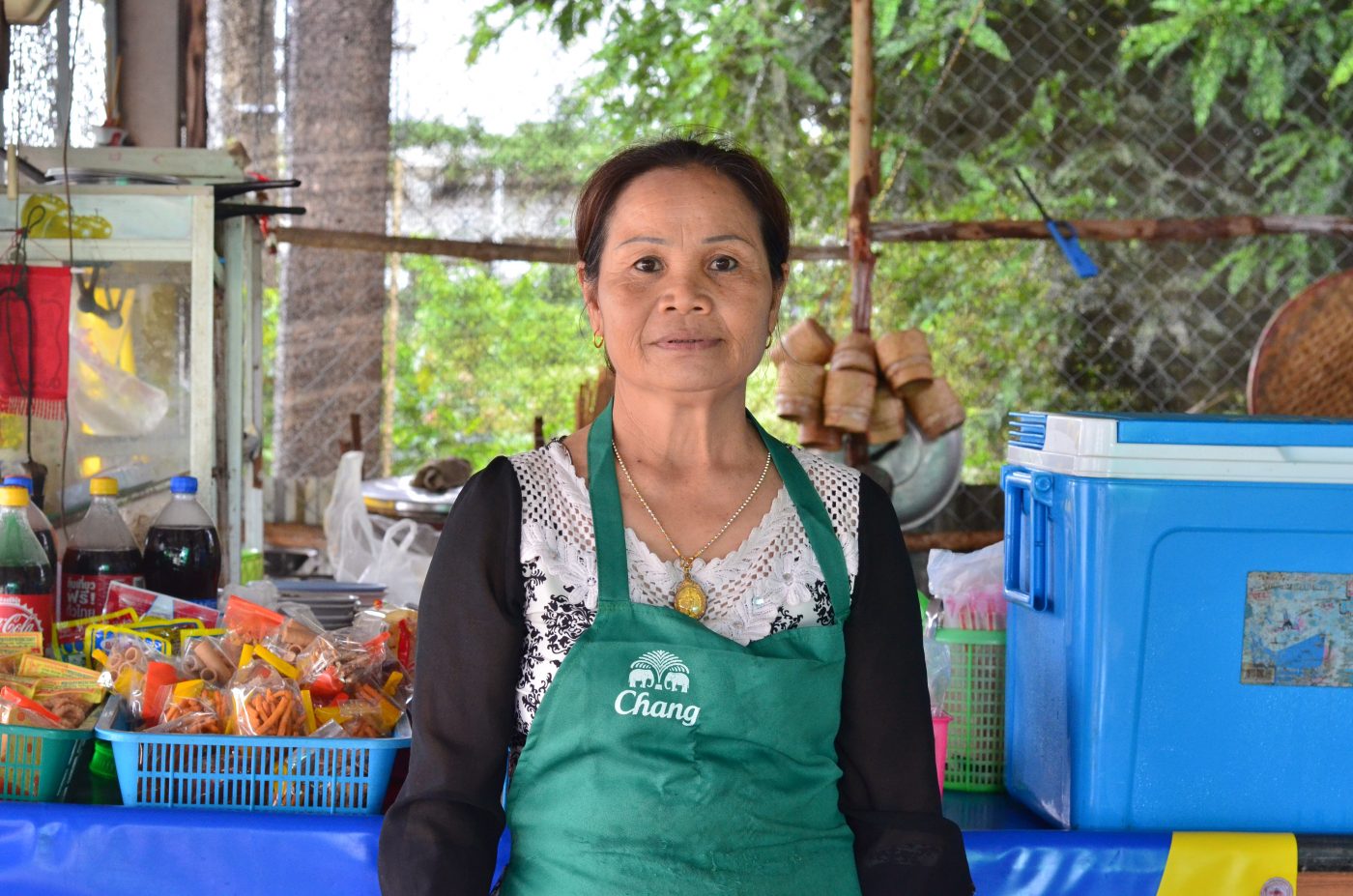NAKHON PHANOM – For years Simala Hongsamanut has run an eatery at the spot where a four-lane highway meets the dirt track leading up to Ban Hom village. Nestled on Khok Phu Kratae hill, the village overlooks the third Thai-Lao Friendship Bridge. Many of Ms. Simala’s customers are the truck drivers coming and going from the bridge which cut the hill and the community in half nearly a decade ago.
In 2015 the military government decided to complement the bridge with a Special Economic Zone (SEZ). As one of ten provincial SEZs declared in that year, the Nakhon Phanom SEZ is part of a grand plan to lure capital investment into Thailand’s faltering economy with the promise of cheap labour, regional connectivity, and lengthy tax holidays.
Now at the center of a legal dispute over land rights between Ms. Simala’s community and the government, the SEZ is splitting the village once again.

Despite the ordeal of being detained at gunpoint by soldiers and policemen prior to legal proceedings, Ms. Simala remains unbowed in her demands for justice that is both substantive and procedural.
By fair means or foul
The military initially used martial law to convict Ban Hom residents of trespassing by military tribunals in 2014. Since martial law was lifted in April 2015, the junta resorted to the draconian powers of Article 44 to quickly clear over 300 villagers from Khok Phu Kratae hill.
But since many villagers remain uncowed by this show of force, the government has tried to secure their eviction with the cooperation of civil branches of government through the civil courts.
“Summary eviction is unacceptable. We have called this place home since 1937. [The government] must treat us with some dignity,” Ms. Simala urges.
The government refuses to be drawn into a moral discussion about its obligations to compensate the community and has adopted a legalistic stance, branding the villagers as trespassers on public land who are–in the words of a local government official–lucky not to be charged back-rent.
Shortly after the coup of May 2014, the military government offered 200,000 baht in relocation allowances to the villagers, according to Ms. Simala. But since they refused this offer, the authorities have dealt in threats and trickery. For months, plainclothes security officers regularly visited and photographed villagers at irregular hours.
On July 29, 2014, soldiers and policemen took a group of villagers to Nakhon Phanom City police station on false pretenses.
“They said we were just going for a short visit to the land office, but instead they detained us in a police station until we signed some documents that we didn’t quite understand,” Ms. Simala says.
The documents turned out to be charge sheets accusing them of trespassing.

The marked area is an approximation of the disputed land. The riverside community–which relies mainly on fishing and small scale farming–maintains that they ought to be fairly compensated by the government for drastic disruptions to their livelihoods if they are to relocate.
Their day in court
In this way, the villagers found themselves in a court case against the government. They appeared in Nakhon Phanom Provincial Court on August 24, 2015, against the public prosecutor, charged with trespassing on public land.
At first, the junta tried to clear the village using order 64/2014, which authorises the military to evict those defined as national forest encroachers–and destroy their houses and crops–without prior notice, compensation, or relocation arrangements. The community’s future hinges not only on the court’s interpretation of the villager’s right to the land, but also the status of the land itself.
In January 2017 the court found the 33 villagers named in the case not guilty of trespassing on public land. They were acquitted because the government could not prove exactly when the villagers entered the area. The villagers were able to produce documentation which, though short of a title deed, nevertheless entitled them to dwell upon and cultivate that land.
Breaking ranks
Only some in the village celebrated the verdict. A breakaway faction of 15 villagers cried foul over the ruling. Accepting the initial verdict is to accept that they are on public land, which sets a dangerous precedent for any future legal action, they argue. They filed an appeal to the Region 4 Court of Appeal on February 14, 2017, warning the other villagers to beware of a cunning legal trap.
The contrarians contend that the provincial court should never have defined it as public land, and that the wording of the verdict should be changed accordingly.
“We absolutely maintain that we are not trespassing on public land,” says Sommai Efwa, one of the villagers who lodged the appeal. “We are on private property, and we have the government-issued documentation to prove it.”
In her opinion, the government could have avoided this struggle by offering the villagers compensation based on the market value of the land in the first place. “They have left us with no option but to fight,“ she says.

A view from the village on Khok Phu Kratae hill: the checkpoint at the foot of the third Thai-Lao Friendship bridge can be seen on the right with the white roof. The cargo trucks are bound for Lao, and the yellow-roofed SEZ office can be seen in the distance.
Uncalled for
A prominent local businessman and member of the city’s Chamber of Commerce, speaking on condition of anonymity, expressed little sympathy for the villagers but was no less scathing about the government’s overall handling of the SEZ.
“No local businesses were consulted about the SEZ. [The government] just threw all ten SEZs out from Bangkok without warning, with words but no concrete plans to provide the supporting infrastructure such as roads, airports and railways,” he says. “They seem to think that if they build it [big business] will come. Business doesn’t necessarily work like that.”
An imbalance of responsibility
Kittima Khunthong, a sociology lecturer at Rajabhat Sakon Nakhon University who is familiar with development issues faced by communities along the Mekong river, is worried about the potential for greater inequality.
“Spreading economic development and prosperity to far-flung corners of the country is often touted as a benefit of the SEZs, but in actual practice the government is contributing to the concentration of prosperity among the few, and spreading further inequality across the country for the many,” Ms. Kittima argues.
Ms. Kittima went on to say that the government has a tendency to handle economic matters with a highly developed sense of responsibility to large capital investors, but with scant regard for its responsibilities to the rest of society, such as those who may not be able to readily jump into the jobs that serve industry in the SEZs.

Sommai Efwa is one of the fifteen of the villagers who decided to represent themselves in court for the appeal. They have broken off contact with the volunteer lawyers who initially represented them in the court case against the government.
Suspended animation
On June 7, the villagers gathered at Nakhon Phanom Provincial Court to hear the ruling on the appeal. The floor before the courtroom entrance was covered by a sea of sandals, as few villagers owned the formal footwear required for court appearances.
As the judge made a roll-call of the defendants, it transpired that four of the elderly among them had died since the appeal was lodged. The judge was visibly disappointed as she informed the villagers that they must return home and await a summons, since the deceased defendants must be formally discharged from the case before the ruling can be revealed.
The villagers appeared to take it in their stride as they stoically got up and filtered out of the courtroom. In the manicured, leafy grounds of the courthouse, Ms. Simala reaffirmed that the villagers are simply asking for fair dealing, and that the outcome doesn’t have to be zero-sum.
“We don’t want to stand in the way of Nakhon Phanom’s development,” Ms. Simala says, “We just want to be treated fairly.”





